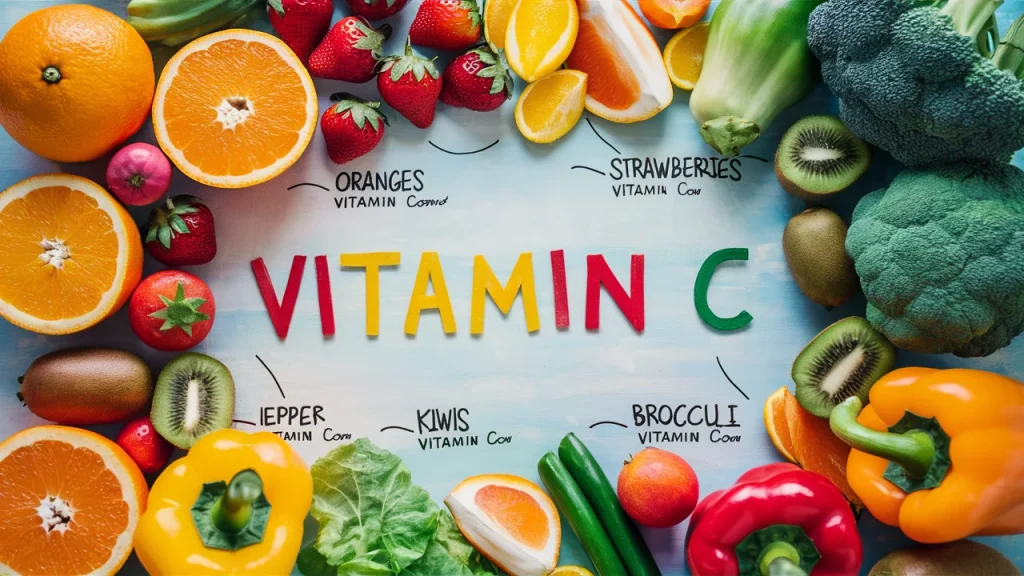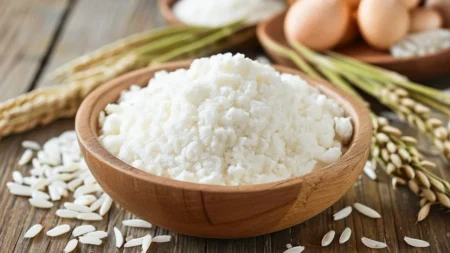Vitamin C, also known as ascorbic acid, is an essential nutrient that plays a vital role in promoting overall health and well-being. It offers a wide range of benefits for the body, from boosting the immune system to supporting skin health and beauty.
One of the key benefits of Vitamin C is its ability to strengthen the immune system. It acts as a powerful antioxidant, helping to protect the body against harmful free radicals and bolstering its defenses against infections and illnesses.

Key Takeaways:
- Vitamin C is essential for overall health and well-being.
- It strengthens the immune system and helps fight off infections.
- Vitamin C promotes collagen production and enhances skin health and beauty.
- Sources of Vitamin C include fruits, vegetables, and supplements.
- Vitamin C deficiency can lead to scurvy and other health issues.
The Power of Vitamin C for Immune Support
Vitamin C plays a crucial role in boosting the immune system and keeping infections and illnesses at bay. Its importance in strengthening the immune system cannot be overstated, as it aids in the production and function of various immune cells that defend the body against pathogens and harmful substances.
When it comes to immune system function, Vitamin C offers a dual approach. Firstly, it helps stimulate the production of white blood cells, which are essential for fighting off infections. These cells include phagocytes, which engulf and destroy bacteria, and lymphocytes, which coordinate and regulate the immune response.
Secondly, Vitamin C acts as a powerful antioxidant, protecting immune cells from damage caused by free radicals released during the immune response. This prevents oxidative stress and ensures the optimal functioning of the immune system.
“Vitamin C is crucial for the optimal functioning of the immune system. It aids in the production and function of immune cells, while also protecting them from damage caused by oxidative stress.”
A deficiency in Vitamin C can weaken the immune system, making individuals more susceptible to infections and taking longer to recover from illness. On the other hand, ensuring an adequate intake of Vitamin C can boost immune function and contribute to overall well-being.
Supportive Research
A study published in the journal Nutrients found that Vitamin C supplementation can reduce the duration and severity of the common cold, a testament to its immune-boosting properties. Additionally, Vitamin C has been shown to enhance the body’s ability to absorb iron, an essential nutrient for immune function.
Vitamin C can be obtained from various dietary sources, such as citrus fruits, strawberries, kiwi, bell peppers, broccoli, and spinach. However, for those who struggle to meet their daily Vitamin C requirements through diet alone, supplements can be a convenient and effective option.
In conclusion, Vitamin C plays a pivotal role in immune support by stimulating the production of immune cells and acting as a potent antioxidant. Maintaining adequate intake of Vitamin C is essential for a robust immune system and overall health.
Vitamin C for Skin Health and Beauty
Vitamin C is not only vital for overall health, but it also offers numerous benefits for skin health and beauty. Its powerful properties make it a favorite ingredient in skincare products and a staple in many skincare routines.
Vitamin C promotes collagen production, which is essential for maintaining the skin’s elasticity and firmness. Collagen is a protein that provides structure to the skin, and as we age, its production naturally decreases. Vitamin C stimulates collagen synthesis, helping to reduce the appearance of fine lines, wrinkles, and sagging skin.
“Vitamin C is a key player in promoting youthful-looking skin by boosting collagen production.”
Brightening the Skin
Another remarkable benefit of Vitamin C is its ability to brighten the complexion. It inhibits the production of melanin, the pigment responsible for dark spots and uneven skin tone. Regular use of Vitamin C can fade hyperpigmentation, leaving the skin more even-toned and radiant.
Vitamin C protects the skin from damage caused by free radicals, unstable molecules that can cause cellular damage and premature aging. It acts as a potent antioxidant, neutralizing these harmful molecules and preventing oxidative stress on the skin. By protecting against environmental aggressors like pollution and UV radiation, Vitamin C helps maintain a healthy and youthful appearance.
“With its antioxidant properties, Vitamin C shields the skin from free radicals, preserving its health and radiance.”
When it comes to reaping the skin benefits of Vitamin C, incorporating it into your skincare routine is key. You can find a wide range of skincare products containing Vitamin C, such as serums, moisturizers, and masks. Look for products with stable forms of Vitamin C, such as ascorbic acid or its derivatives, as they are better absorbed by the skin.
For optimal results, it is recommended to use Vitamin C products consistently and protect the skin with sunscreen during the day, as Vitamin C can enhance the skin’s defense against UV damage.
The Power of Vitamin C for Your Skin
| Benefits of Vitamin C for Skin Health | Explanation |
|---|---|
| Promotes collagen production | Vitamin C stimulates the synthesis of collagen, reducing the appearance of wrinkles and sagging skin. |
| Brightens the complexion | Vitamin C inhibits melanin production, helping to fade dark spots and even out skin tone. |
| Protects against free radicals | Vitamin C’s antioxidant properties shield the skin from damage caused by free radicals, preserving its health and radiance. |
By incorporating Vitamin C into your skincare routine, you can enjoy the numerous benefits it offers for your skin. From enhancing collagen production to brightening the complexion and protecting against free radicals, Vitamin C is a true powerhouse for skin health and beauty.
Top Sources of Vitamin C
Vitamin C, also known as ascorbic acid, is a vital nutrient that plays a crucial role in maintaining good health. Incorporating Vitamin C-rich foods into your diet is essential to ensure an adequate intake of this important vitamin. Here are some of the top sources of Vitamin C:
Citrus Fruits
Citrus fruits like oranges, lemons, grapefruits, and limes are well-known for their high Vitamin C content. These juicy fruits not only provide a refreshing burst of flavor but also deliver a significant amount of immune-boosting Vitamin C.
Strawberries
Strawberries are not only delicious but also packed with Vitamin C. These bright red berries are a great addition to your diet, providing not only a natural sweetness but also a boost of antioxidants and anti-inflammatory properties.
Kiwi
Kiwi is a small fruit with a tangy flavor that is loaded with Vitamin C. Just one medium-sized kiwi can provide more than the recommended daily intake of Vitamin C, making it an excellent choice to meet your daily requirements.
Red Bell Peppers
Red bell peppers are not only colorful and crunchy but also an excellent source of Vitamin C. In fact, red bell peppers contain more Vitamin C than citrus fruits. Add them to salads, stir-fries, or enjoy them raw for a nutritious Vitamin C boost.
Kale
Kale is a leafy green vegetable that is not only rich in Vitamin C but also packed with other essential nutrients. Adding kale to your diet can provide a significant amount of Vitamin C along with vitamins A, K, and calcium.
Papaya
Papaya is a tropical fruit known for its vibrant color and delicious taste. It is also an excellent source of Vitamin C. Incorporating papaya into your diet can help boost your immune system and support overall health.
Other notable sources of Vitamin C include guava, broccoli, pineapple, and mango. By including a variety of these Vitamin C-rich foods in your meals, you can ensure that your body receives the necessary dose of this essential nutrient for optimal health.
| Food | Vitamin C Content per 100g |
|---|---|
| Oranges | 53.2mg |
| Strawberries | 59.0mg |
| Kiwi | 92.7mg |
| Red Bell Peppers | 128.0mg |
| Kale | 120.0mg |
| Papaya | 60.9mg |
Vitamin C Supplements: Dosage and Absorption
While incorporating Vitamin C-rich foods into your diet is essential, Vitamin C supplements can also be a convenient option to meet your daily requirements. These supplements provide a concentrated dose of Vitamin C, ensuring you receive adequate levels of this vital nutrient.
When it comes to the dosage of Vitamin C supplements, it is important to follow the recommended guidelines. The dosage may vary depending on factors such as age, overall health, and specific needs. Generally, the recommended daily allowance (RDA) for adults is between 75-90 milligrams.
It is important to note that consuming excessive amounts of Vitamin C through supplements may have negative effects on the body and lead to gastrointestinal issues. Therefore, it is crucial to adhere to the recommended dosage and consult with a healthcare professional if you have any concerns or specific health conditions.
Now, let’s delve into the absorption of Vitamin C in the body. After consuming Vitamin C supplements, the nutrient undergoes a complex process of absorption and utilization. The body absorbs Vitamin C primarily in the small intestine, where it is delivered into the bloodstream.
Vitamin C absorption can be influenced by various factors, including the presence of other nutrients, the overall health of the gastrointestinal tract, and individual differences in metabolism. It is always beneficial to consume Vitamin C alongside foods that enhance its absorption, such as fruits and vegetables.
Vitamin C Absorption Enhancers
- Citrus fruits: Oranges, lemons, and grapefruits contain natural compounds that enhance Vitamin C absorption.
- Berries: Strawberries, blueberries, and raspberries also provide helpful compounds that improve Vitamin C absorption.
- Broccoli: This cruciferous vegetable contains substances that enhance the absorption of several nutrients, including Vitamin C.
- Kiwi: Known for its high Vitamin C content, kiwi also contains enzymes that aid in Vitamin C absorption.
- Peppers: Bell peppers, especially red and yellow varieties, are excellent sources of both Vitamin C and compounds that enhance its absorption.
By combining Vitamin C supplements with these Vitamin C absorption enhancers in your diet, you can optimize the absorption and utilization of this essential nutrient.
| Vitamin C Supplement Types | Recommended Dosage Range (milligrams) |
|---|---|
| Vitamin C tablets/capsules | 500-1000 mg |
| Vitamin C chewables | 250-500 mg |
| Vitamin C effervescent powders/tablets | 1000 mg |
| Time-release Vitamin C | 500-1000 mg |
| Vitamin C injections (Prescription only) | Varies depending on individual needs and under healthcare professional supervision |
Recognizing Vitamin C Deficiency
Vitamin C is an essential nutrient that plays a crucial role in maintaining overall health and well-being. However, a deficiency in this vital vitamin can lead to various health issues. Recognizing the symptoms and signs of Vitamin C deficiency is essential for early intervention and optimal health.
Symptoms of Vitamin C Deficiency
Vitamin C deficiency can manifest in several ways, with symptoms ranging from mild to severe. Common symptoms of Vitamin C deficiency include:
- Fatigue and weakness
- Frequent infections and slow wound healing
- Joint and muscle aches
- Swollen and bleeding gums
- Dry and rough skin
It is important to note that a severe deficiency in Vitamin C can lead to a condition called scurvy.
Scurvy: A Recognizable Vitamin C Deficiency
Scurvy is a severe form of Vitamin C deficiency characterized by the breakdown of collagen and connective tissues. Historically associated with sailors, scurvy causes symptoms such as:
- Extreme fatigue and weakness
- Skin rashes and bruises
- Joint pain and swelling
- Anemia
- Severe gum disease
If left untreated, scurvy can have serious consequences on overall health and can be life-threatening.
“Vitamin C deficiency, including scurvy, is a preventable condition that can be addressed through proper nutrition and dietary choices.” – Dr. Jane Thompson, Nutrition Specialist
Addressing Vitamin C Deficiency
Recognizing the signs of Vitamin C deficiency is the first step in addressing the issue. If you suspect that you or someone you know may be deficient in Vitamin C, it is crucial to seek medical advice. A healthcare professional can assess your symptoms, conduct relevant tests, and provide recommendations for treatment.
Addressing Vitamin C deficiency typically involves increasing Vitamin C intake through dietary changes and, if necessary, supplementation. Including Vitamin C-rich foods, such as citrus fruits, berries, bell peppers, and broccoli, in your diet can help restore optimal Vitamin C levels.
| Food Sources | Vitamin C Content (per 100 grams) |
|---|---|
| Oranges | 53.2 mg |
| Kiwi | 92.7 mg |
| Strawberries | 58.8 mg |
| Red bell peppers | 127.7 mg |
| Broccoli | 89.2 mg |
Supplementation may be recommended in cases where dietary changes alone are insufficient. However, it’s important to consult with a healthcare professional before starting any supplements to ensure appropriate dosage and safety.
Recognizing and addressing Vitamin C deficiency is crucial for maintaining optimal health and well-being. By understanding the symptoms and taking proactive steps to include Vitamin C-rich foods and, if necessary, supplements, individuals can support their overall health and prevent the risks associated with Vitamin C deficiency.
The Antioxidant Properties of Vitamin C
Vitamin C is renowned for its powerful antioxidant properties that play a crucial role in maintaining overall health. As an antioxidant, Vitamin C acts as a shield, protecting our cells from the damage caused by harmful free radicals.
Free radicals are unstable molecules that can cause oxidative stress in the body. This stress is associated with various chronic conditions, including heart disease, cancer, and aging. Vitamin C works tirelessly to neutralize these free radicals, preventing them from causing harm.
One of the remarkable aspects of Vitamin C as an antioxidant is its ability to regenerate other antioxidants, such as vitamin E, glutathione, and coenzyme Q10. This means that Vitamin C not only directly scavenges free radicals but also helps to rejuvenate and optimize the functioning of other vital antioxidants in the body.
Additionally, Vitamin C’s antioxidant properties extend beyond cellular protection. They also contribute to the maintenance of the immune system, helping to defend against infections by enhancing immune cell function. This dual role of Vitamin C as an antioxidant and immune system regulator further highlights its importance for overall well-being.
Incorporating Vitamin C-rich foods, such as citrus fruits, berries, peppers, and leafy greens, into your diet is an excellent way to ensure an adequate intake of this powerful antioxidant. Moreover, Vitamin C supplements can be a convenient option for individuals who may have difficulty meeting their daily requirements through diet alone.
Key Takeaways:
- Vitamin C’s antioxidant properties protect cells from oxidative stress caused by free radicals.
- Vitamin C regenerates other antioxidants in the body, optimizing their functioning.
- Vitamin C plays a dual role in immune support and cellular protection.
- Adding Vitamin C-rich foods to your diet and considering supplements can help maintain optimal antioxidant levels.
Other Health Benefits of Vitamin C
Vitamin C offers a wide range of health benefits beyond its immunity-boosting properties. Incorporating this powerful nutrient into your diet can have positive effects on various aspects of your well-being. Let’s explore some other notable health benefits of Vitamin C:
Cardiovascular Health Support
Vitamin C plays a crucial role in promoting cardiovascular health. It helps maintain healthy blood vessels by aiding in the production of collagen, a protein essential for their structure and function. Furthermore, Vitamin C’s antioxidant properties help protect blood vessels from oxidative stress, reducing the risk of heart disease and hypertension.
Reduced Risk of Chronic Diseases
Studies have shown that a higher intake of Vitamin C is associated with a lower risk of chronic diseases, including certain cancers, stroke, and eye conditions such as cataracts and macular degeneration. The antioxidant properties of Vitamin C help neutralize free radicals and reduce oxidative damage, contributing to overall disease prevention.
Enhanced Iron Absorption
Vitamin C enhances the absorption of non-heme iron, the type of iron found in plant-based foods. By consuming Vitamin C-rich foods or supplements alongside iron-rich plant sources, such as lentils or spinach, you can optimize iron uptake and prevent iron deficiency anemia.
These additional health benefits highlight the importance of Vitamin C in promoting overall well-being. Incorporating Vitamin C-rich foods like citrus fruits, berries, broccoli, and bell peppers into your daily diet can help you harness the full potential of this essential nutrient. Remember to consult with a healthcare professional for personalized advice on Vitamin C intake and supplementation.
The Importance of Vitamin C in Overall Well-being
Vitamin C plays a crucial role in maintaining good health and well-being. Its importance extends to various bodily functions and processes, making it an essential nutrient that should not be overlooked.
One of the key benefits of Vitamin C is its role in supporting a strong immune system. Studies have shown that Vitamin C helps boost the production of white blood cells, which are responsible for fighting off harmful pathogens and infections.
In addition to immune support, Vitamin C is also known for its antioxidant properties. Research suggests that Vitamin C helps neutralize harmful free radicals, protecting the body’s cells from oxidative stress and damage.
Vitamin C is also vital for collagen production, a protein that helps maintain the health and elasticity of tissues, including the skin, blood vessels, and bones. Clinical trials have shown that Vitamin C can help reduce the signs of aging and improve skin health.
Moreover, Vitamin C plays a crucial role in optimizing iron absorption. Studies have found that consuming Vitamin C-rich foods or supplements alongside iron-rich sources enhances the body’s ability to absorb and utilize iron, preventing iron deficiency anemia.
It’s important to note that Vitamin C is water-soluble, meaning that the body does not store it, and regular intake is necessary to maintain optimal levels. While it’s possible to obtain Vitamin C from various food sources, such as citrus fruits, strawberries, bell peppers, and leafy greens, supplementation can also be beneficial, especially for individuals with dietary restrictions or specific health conditions.
It’s crucial to ensure an adequate intake of Vitamin C to support overall well-being and maintain optimal health. From immune support to collagen production and antioxidant benefits, Vitamin C offers a wide range of positive effects on the body.
| Vitamin C Benefits | Key Points |
|---|---|
| Immune support | Boosts white blood cell production for enhanced immune function. |
| Antioxidant properties | Helps neutralize free radicals and protect cells from oxidative damage. |
| Skin health and beauty | Promotes collagen production, reducing signs of aging and improving skin health. |
| Iron absorption | Facilitates the absorption and utilization of iron, preventing iron deficiency anemia. |
By incorporating Vitamin C into your daily diet and, if necessary, supplementing with Vitamin C, you can ensure that your body receives the necessary amount of this vital nutrient. Prioritizing Vitamin C intake is a simple step towards maintaining overall well-being and supporting a healthy, thriving life.
Conclusion
In conclusion, Vitamin C plays a vital role in promoting overall health and well-being. Throughout this article, we have explored the various benefits of Vitamin C, from strengthening the immune system to enhancing skin health and beauty.
By including Vitamin C-rich foods in your daily diet or considering Vitamin C supplements, you can ensure an adequate intake of this essential nutrient. Vitamin C not only acts as a powerful antioxidant, protecting cells from oxidative stress, but it also supports cardiovascular health, reduces the risk of chronic diseases, and aids in iron absorption.
Recognizing the signs of Vitamin C deficiency and addressing them promptly is crucial for maintaining optimal health. From boosting the immune system to promoting collagen production, Vitamin C plays a key role in supporting overall well-being. Make it a priority to incorporate Vitamin C into your daily diet and lifestyle choices for a healthier, more vibrant life.
FAQ
What are the benefits of Vitamin C?
Vitamin C offers numerous benefits for overall health, including immune system support, collagen production for skin health, antioxidant properties, and potential prevention of chronic diseases.
How does Vitamin C boost the immune system?
Vitamin C helps strengthen the immune system by promoting the production of white blood cells, which are essential for fighting off infections. It also enhances the function of immune cells and helps reduce the duration and severity of colds and other illnesses.
What are the skin benefits of Vitamin C?
Vitamin C promotes the production of collagen, which helps maintain the elasticity and firmness of the skin. It also reduces the appearance of wrinkles, brightens the skin, and protects against damage caused by free radicals.
What are the top sources of Vitamin C?
Fruits such as oranges, strawberries, and kiwis, as well as vegetables like bell peppers and broccoli, are excellent sources of Vitamin C. Other sources include guava, papaya, tomatoes, and dark leafy greens.
How much Vitamin C should I take, and how is it absorbed by the body?
The recommended daily intake of Vitamin C varies based on age and gender. For adults, it is generally around 75-90 milligrams. The body absorbs Vitamin C through the small intestine, with absorption increasing when Vitamin C levels are low.
What are the symptoms of Vitamin C deficiency?
Vitamin C deficiency can lead to scurvy, which is characterized by symptoms such as fatigue, weakness, joint pain, bleeding gums, and delayed wound healing. Other signs may include dry and splitting hair, rough skin, and frequent infections.
How does Vitamin C act as an antioxidant?
Vitamin C acts as a potent antioxidant, neutralizing free radicals in the body. It helps protect cells from oxidative stress, which can lead to chronic diseases. Vitamin C also regenerates other antioxidants in the body, such as Vitamin E.
Are there any other health benefits of Vitamin C?
Yes, apart from immune support and skin health, Vitamin C is also important for cardiovascular health, reducing the risk of certain chronic diseases, and enhancing iron absorption from plant-based sources.
Why is Vitamin C important for overall well-being?
Vitamin C plays a crucial role in various bodily functions, including collagen synthesis, immune function, antioxidant defense, and iron absorption. It is essential for maintaining optimal health and overall well-being.











